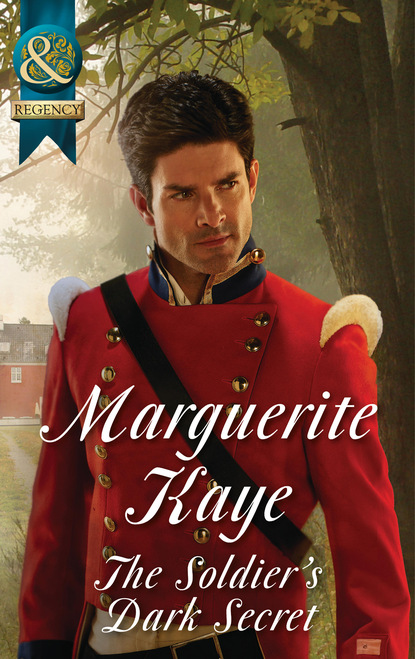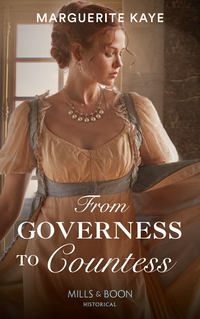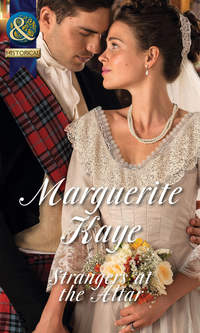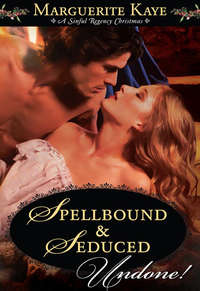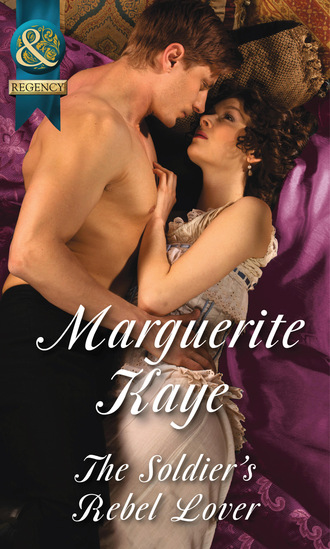
Полная версия
The Soldier's Rebel Lover
‘Well, now, Isabella, it seems to me that it would be daft for us both—my men and yours—to consider launching a sortie against this French arms dump, would it not? No point treading on each other’s toes unnecessarily.’
His accent was strange, lilting, soft, and some of the words he spoke she could not translate, but she understand him only too well. He was going about it more subtly this time, but he was still interested in one thing only from her: what were the partisans’ intentions with regard to the French arms cache? Fine and well, for that was also the only reason she was interested in him. The thought made Isabella smile, and her smile made the soldier look at her quizzically, an eyebrow raised, his own sensual mouth quirking up on one side.
‘I’d give a lot to know what is going on in that bonny head of yours, señorita. I mean,’ he said, when she looked confused, ‘I’d like to know what you are thinking.’
‘I wager you would, soldier, but I’m not going to tell you.’
‘Finlay. It’s Finlay.’
‘Finlay,’ she repeated.
‘Aye, that’s it, you have it. There’s not many use my name these days, apart from at home, that is. But it’s been nigh on seven years since I’ve been there.’
‘And where is home?’ Isabella asked.
‘A village in Argyll, not far from Oban. That’s in the Highlands of Scotland. My family live in a wee cottage not unlike the ones you see in the villages hereabouts, and they farm, too, just like the villagers here, though they grow oats not wheat, and it’s far too cold and wet for grapes, so there’s no wine. Mind you, my father makes a fine whisky. He has a boat, too, for the fishing.’
Isabella stared at him in surprise. ‘So your family are peasant stock? But you are an officer. I thought that all English officers were from grand English families. The Duke of Wellington, he is famous—’
‘For saying that an officer must also be a gentleman,’ Finlay interrupted her, making no attempt to hide his contempt. ‘I’m the exception that proves the rule—an officer who is definitely not a gentleman,’ he clarified. ‘And I’ll remind you, for the last time, that I’m not English. I’m Scottish.’
‘I’m sorry. I think it is like calling a Basque person Spanish, no? I did not mean to insult you.’
‘I’ve been called much worse, believe me. Are you from the area, then? I hope I’ve not insulted you by speaking Spanish. I’m afraid the only words I have in Basque I would not utter in front of a lady.’
The word was like a touchpaper to her. ‘I am not a lady. I am a soldier. I may not wear a military uniform like my brother, but I, too, am fighting for the freedom of my country, Major Urka—Urko—Major Finlay.’
‘By heavens, you’ve some temper on you. I’ve clearly touched a raw nerve there.’
‘You have not, I am merely pointing out...’
He picked up one of her hands, which was curled into a very tight fist, and forced it open. She tried to resist but it was a pointless exercise; his big calloused hand had the strength of ten of hers. It was only when he let her go that she realised he could easily have hurt her, and had taken good care not to. Was he being chivalrous? Patronising? Was he showing her, tacitly, that a man was better, stronger than a woman? Why was it always so complicated? And why, despite his show of strength—or muted show of strength—did she feel no fear? She was alone in the dark of night with a complete stranger. A man who could overpower her and force himself on her if he wanted to. Her hand slid to her holster, though it was rather because she knew she ought to do so than because she thought she needed to.
‘I won’t harm you.’ He was looking pointedly at her hand. ‘You have my word. I have never in my life forced myself on a woman.’
He would have no need. And even though she knew, as everyone knew after being so long at war, what many soldiers did to women in the aftermath of battle, she could not imagine that this man would. There had been a grimness in his voice when he’d warned her about the French soldiers; it spoke of experiences he would rather forget. But then everyone involved in this struggle, including her, shared those.
Isabella gave herself a shake. ‘I believe you,’ she said, realising that Finlay was still waiting on an answer.
‘Good.’
His tone was curt, though he should be grateful for her trust. And she did trust him, which was extremely surprising and, little did he know it, very flattering. She glanced at him, as he sat, eyes closed, head thrown back, resting on his elbows. He did not look like the poor son of a farmer. He did not look like a peacock officer, either, and while he certainly didn’t have the hands of a gentleman, he had the manners of one. No, that was not fair. He had not treated her as a fragile flower with no mind. He had treated her with respect, and she liked that. He would be a popular officer, she was willing to bet, and those were few and far between, if her brother was to be believed. She tried to imagine her brother wearing that skirt—kilt. He would look like a girl, while this man—no, there was nothing at all feminine about this man.
‘Once again, lass, I’d give a lot to know what’s going on in that head of yours.’
Caught staring, Isabella looked hurriedly away. ‘I was thinking that you must be a very good soldier, to have become a major.’
Finlay laughed. ‘That is a matter of opinion. Being a good soldier and a good officer don’t necessarily go hand in hand. It’s taken me a great deal more time and effort than most to get to where I am. As you said yourself, Wellington is not at all keen on the idea of commoners rising through the ranks.’
‘In that, I think the Spanish and the English— British armies are the same,’ Isabella said. ‘Before the war, most of the officers were more concerned with the shine of their boots than the fact that some of their men had no boots at all. Things will be different when we have won our country back from the French.’
‘You speak with conviction. It is not over yet.’
‘No, but when it is...’
‘Oh, when it is we can but hope that the world will turn in a different direction,’ Finlay replied. ‘Maybe they’ll even allow women soldiers,’ he added with a wry smile. ‘Though if you asked me to tell the truth, I’d say that right now, the army is no fit life for anyone, man or woman. We’ve been fighting too hard for too long, and all we want is for it to be over.’
‘That is all my people desire, too.’
‘Aye, you’re in the right of it. You must be desperate to see the back of all of us.’
‘If you mean that we want you to go home...’
‘To have your country back.’
‘Yes.’
‘And your life.’
‘Yes,’ Isabella said again, though with less certainty.
‘Provided that it doesn’t go back to exactly how it was before, eh?’ Finlay said, as if he had read her mind. ‘Now that you’ve had a wee—a small taste of freedom?’
‘Yes.’ Isabella smiled. ‘A wee taste of freedom,’ she repeated carefully. ‘And you, too, you will be able to go back to your father’s farm in Scotland, and see all your loved ones. You will like that?’
‘I will look forward to it,’ he said, after a moment, sounding, to her surprise, as hesitant as she had.
‘You do not wish to see your family?’
‘Oh, aye, only I don’t—ach, no point in talking about that. The war’s not over yet. Once we’ve kicked the French out of Spain, we’ll like as not have to chase them across France for a while. Which leads me back to that cache of arms.’ He sat up, pushing his hair back from his forehead. ‘Look, you don’t know me and I don’t know you, but these are unusual circumstances we find ourselves in. We can’t allow the French to turn those guns on either of us, and I can make sure that they don’t. Have I your assurance that the local rebel forces won’t interfere and queer the pitch?’
‘I don’t know what that means, but regardless, I think it would be much better to leave it in our hands,’ Isabella said firmly. ‘We will put the arms to good use, and—and it would be excellent for morale and quite a coup if we were successful.’
Finlay pressed his fingertips together, frowning down at his hands. ‘I’ll be frank with you. I would quite happily agree to what you suggest if I could only be sure that the mission would be successfully accomplished. You understand, much as I’d like to, I can’t just simply take your word for it.’
She bit back her instinctive retort, frowning now herself. ‘If I told you that the information I have gathered tonight would go direct to El Fantasma, would that be enough to convince you?’
‘You know El Fantasma?’
Isabella nodded.
Finlay looked unconvinced. ‘He is like his name, a ghost. Everyone has heard of him, nobody knows him.’
‘I do,’ she said firmly. ‘At least, I know how to get in touch with him.’
‘Can you prove it?’
‘I cannot. I can only give you my word.’ She spoke proudly, held his gaze without blinking and was rewarded, finally, with a small nod of affirmation.
‘You have three days to act. If I don’t receive word that you have been successful by then, I’ll send my own men in to finish the job.’
‘Thank you. You can be sure that word will be sent to you before the three days are up.’
He took the hand she held out, enveloping it in his own. ‘You don’t ask where to send word.’
With a smile of satisfaction, she told him exactly where his men were encamped. ‘One of our men will find you.’
‘I’m beginning to think they will.’ He still had her hand in hers, but instead of shaking it as she had seen Englishmen do, he once again bent his head and brushed her fingertips with his lips. ‘We have an agreement, then,’ he said.
Once again, the touch of his lips on her skin gave her shivers. Isabella snatched her hand away. ‘We have indeed,’ she said quickly.
She had what she wanted; she was free to leave. Reluctantly, she made to get to her feet, but the Scotsman’s hand on her arm stopped her. ‘Stay until it’s light, won’t you? It’s not safe for me to leave before then. Unlike you, I don’t know the terrain. Also, it’s been a while since I’ve had the company of a woman. It would be good to talk of something other than guns and field positions.’
‘You think I cannot?’
‘Why in the name of Hades are you so prickly? I’m not one of those men who think women have no mind of their own. If you met my mother, you’d know why.’ He turned to look at her, his gaze disconcertingly direct. ‘As to you women being the weaker sex—if ever I thought that, just seeing what the wives following the drum have to endure would change my mind. They have to be every bit as tough as their menfolk. Tougher, in some cases, when they have bairns with them. Though I’d be lying, mind, if I said I thought it was an appropriate life for them.’
He broke off, giving himself a little shake. ‘Ach, I’m sorry, I didn’t mean to rant at you. If you want to talk guns and tactics, then that’s what we’ll talk. Only indulge me with a few hours of your company, and grant me the pleasure of looking on your bonny face, for it will be a while, I reckon, until I get the chance to do either again.’
His smile was beguiling. The look he gave her neither contrite nor beseeching, but—charming? He was not a man accustomed to being refused. On principle, she should refuse, but she was rather sick of principles, and what, after all, was the harm in allowing herself to be charmed for such a very short while?
Isabella permitted herself to smile back. ‘I do not think a man like you has any trouble at all in finding female company.’
He laughed again, showing her a set of very white teeth, shifting on the ground, giving her a brief, shockingly tantalising glance of a muscled thigh as he did so. ‘The trouble is, I’m a bit fussy about the female company I choose,’ he said. ‘I prefer to get to know a woman before I—before— What I mean is, I’ve a taste for conversation that I’ve not recently been able to indulge. Now, that makes me sound like I’m right up my own ar— I mean, like a right fop, and I’m not that.’
Isabella chuckled. ‘I am not exactly sure what this fop is, but I am very sure it is not a label that fits you.’
‘What I mean is, I like the company of women for their own sake.’
‘And I think that women like the company of Major Urk—of Finlay.’
‘Right now there’s only one woman’s company I’m interested in. Will you stay a few hours, Isabella?’
Why not? Her father would cover for her absence if necessary, but likely she’d be back in her bed before anyone noticed it had not been slept in. What harm could it do to indulge this man with a few hours’ conversation? The fact that he had a beguiling smile and a handsome face and a very fine pair of legs had nothing to do with it. ‘Why not?’
He smiled. ‘Tell me a bit about yourself, then. Are you from these parts?’
‘Hermoso Romero. It’s not far from here. We have— My family has some land.’
‘So they’re farmers, peasant stock as you call it, just like mine?’
‘They live off the land, yes.’
‘And it’s just you and your parents you say, for your brother’s in the army?’
‘Just me and my father. My mother is dead.’
‘Oh, yes, you mentioned that. I’m sorry.’
‘Thank you, but I never knew her. She died when I was very young.’
‘Then, I’m very sorry for you indeed. A lassie needs her mother, especially if she’s not got a sister.’
‘I cannot miss what I have not had,’ Isabella said stiffly.
Finlay opened his mouth to say something, thought the better of it, and shrugged, reaching over to pull his saddlebag towards him. ‘Would you like something to eat? I’m hungry enough to eat a scabby-headed wean.’
‘A— What did you say?’
‘I said I’m very hungry. This is all I have, I’m afraid,’ he said, passing her a handful of dry biscuits. ‘It tastes better washed down with this, though,’ he added, holding out a small silver flask. ‘Whisky, from my father’s own still. Try it.’
She sipped, then coughed as the fiery spirit caught the back of her throat. ‘Thank you,’ she said, returning the flask and wrinkling her nose, ‘I think I will stick to water.’
‘It is an acquired taste, right enough,’ Finlay said, putting the cap back on after taking, she noticed, only a very small sip himself. ‘Tell me a bit more about yourself. For example, how does it happen that such a bonny lass is not married?’
‘How does it happen that such a—bonny?—man is not married?’
Finlay laughed. ‘No, no, you don’t describe a man as bonny, unless you wish to impugn him. I’m not married because I’m a soldier, and being a soldier’s wife is no life worth having. Since I am a career soldier, my single status is assured. Now I have explained myself. What about you?’
Isabella shrugged. ‘While my country is at war and under occupation, I cannot think of anything else.’
‘Aye, I can understand that. It’s hard to imagine what peace will look like after all this time.’ Finlay pulled a blanket from his saddle and offered it to her. ‘Here, it’s getting mighty cold.’
‘I do not need...’
‘For the love of— Come here, will you, and we’ll share it, then.’ Taking her by surprise, he pulled her towards him, throwing the blanket around them. He grabbed her arm as she tried to struggle free, and slid his own across her shoulders. ‘I’d do the same for one of my own men if I had to,’ he said.
‘I don’t believe you.’
‘It’s a sacrifice I’d be prepared to make—I hope. Luckily I’ve never had to put myself to the test.’
She felt the rumble of his laugher, and the warm puff of his breath on her hair. She had not noticed how cold it had become until he put the blanket around her. It would be churlish to push him away now, and a little silly, for then she would have to walk in the morning with stiff, cold limbs. She did not relax, but she no longer struggled, and allowed herself to lean back against the tree trunk. ‘Tell me more about Scotland,’ she said. ‘Is it very different from Spain?’
‘Very. For a start, there’s the rain. The sky and the sea are more often grey than blue. Mind, all that rain makes for a green landscape. I think that’s what I miss the most, the lush greenery that carpets the valleys and hills.’
‘We have a lot of rain here in the north, in the winter.’
‘Aye, but in Scotland, on the west coast, it rains most days in the summer, too. Are you sleepy? Should I stop babbling?’
Isabella smothered a yawn. ‘No, if you mean should you stop talking. Tell me what other countries you have visited as a soldier.’
‘Many campaigns. Egypt. Portugal. France. Ireland. America.’
‘You are so lucky, I have never been out of Spain.’
‘I’m not sure that you see the best of a country when you go there to fight.’
‘No, but—tell me please. Describe what America is like. Is it the wild, untamed wilderness that I have heard tell of?’
‘Once you leave the east coast, yes. And vast. A man could lose himself there.’
‘Or find himself?’
* * *
Finlay was still musing on that thought when Isabella wriggled around under the blanket to look up at him. He tensed, willing his body not to respond to the supple curves of her. Her hair tickled his chin. He was inordinately grateful for the thick layers of clothing between them, and tried discreetly to shift his thigh away from hers. Concentrating his mind on answering her questions, he found she drew him out, that his desire, while it remained a constant background tingle, was subdued by his interest in her, by hers in him.
Eventually, as the moon sank and true darkness fell, they grew silent. He thought she slept, though he could not be sure. He thought he remained awake, though he could not be certain of that, either. They moved neither closer nor farther apart, and that, Finlay told himself, was as it should be.
* * *
In the morning he was glad of it. She stirred before sunrise, and he lay with his eyes closed, affording her some privacy. Only when she stood over him did he pretend to wake, getting to his feet, trying not to notice the way the water she had splashed on her face had dampened her hair, making a long tress of it cling to her cheek.
‘You will find your way back to your own lines?’ she asked.
He nodded. ‘It’ll be easier in daylight, provided I keep a weather eye out for French patrols.’
‘I will send word when we have—when it is done, I promise.’
‘I believe you.’
He took the hand she offered him. In the dawn light, her eyes seemed more golden than brown. He wanted to kiss that nervously smiling mouth of hers. He wanted, quite fervently, to have her body pressed against his, her arms around his neck. He took a step towards her. For a moment he felt it, the tug of desire between them, that unmistakable feeling, like the twisting of a very sharp knife in his guts. It was because he wanted to kiss her so much that he stopped himself, bent over her hand, clicking his heels together, then let her go. ‘Adiós, Isabella. Good luck. Please be careful. Stay safe.’
‘Goodbye, Finlay. May God protect you and keep you from harm.’
She turned and slowly walked away, following the path of the stream as it meandered along the floor of the valley. Finlay watched her until she disappeared from sight behind a large outcrop of rock. Then he picked up his saddle, and within a few moments, just as the sun streaked the sky with pink-and-orange fingers, he, too, was on his way, heading in the opposite direction.
Chapter Two
England—autumn 1815
‘So, Jack, are you going to spill the beans on why you had me hotfoot it down here? I’m intrigued. But then knowing you, you old fox, that was precisely your intention when you composed the enigmatic message I received.’
They were strolling in the grounds of Jack’s brother’s home, Trestain Manor, where he was currently residing, Finlay having arrived post-haste in answer to an urgent summons. Now he eyed his friend grimly. ‘You’re looking a bit rough around the edges, if you don’t mind my saying so. Is this anything to do with the information I dug up for you regarding your wee painter lassie?’
‘Her name is Celeste, and she is not, as I told you in London, my wee painter lassie,’ Jack snapped. ‘Sorry. I’m just— What you told me helped me a lot, and I’m hoping to solve the rest of the puzzle now that I have permission from Wellington to delve into those secret files.’
‘But things concerning the lassie herself don’t look so hopeful?’ Finlay asked carefully.
Jack shrugged. ‘Let’s just say I’m advancing on some fronts but have sustained some collateral damage on others.’ The words were light-hearted but the tone of his friend’s voice told Finlay the subject was not open for further discussion. ‘The reason I asked you here is nothing to do with that, although indirectly it brought it about.’
Finlay rolled his eyes. ‘Would you get to the point and stop talking in code, man!’
Jack smiled faintly. ‘A habit that’s difficult to break. It’s a delicate matter, though, Finlay, and obviously everything I tell you is in the strictest confidence. I don’t mean to insult your utter trustworthiness, but Wellington made me promise...’
‘Wellington!’
‘When I accosted him at that dinner I attended on your behalf with my little problem of those secret files, he told me about a little problem of his own.’ Jack’s expression darkened. ‘Save that it’s not only the duke’s problem, Finlay. I see it as very much mine. When we were in Spain, do you recall talk of a partisan commander called El Fantasma?’
‘The Ghost! I’d have had to be deaf and dumb not to. He was a legend in the north during the Peninsular Campaign.’
‘Yes, he was. The partisans in that area were incredibly effective in targeting the French supply lines thanks to him, and in intercepting mail. He was one of my most reliable and effective spies. The information he provided saved a great many lives.’ Jack plucked a long piece of grass, and began to twine it around his finger. ‘The thing is, Finlay, this El Fantasma knows some pretty compromising stuff, politically, that is. Some of the things that were done in the name of war—they wouldn’t stand up to much scrutiny in the press.’
‘Jack, none of the reality of war would sit well with the peacetime press.’
‘You’re right about that. To be honest, I think it would be a good thing if some of it did come into the public domain. Since Waterloo, no one wants to know about the suffering of those who fought, the pittance they have to live on, the fact that the army has cast them aside, having no further need for them.’ Jack broke off, fists clenched. ‘Sorry, I know I’m preaching to the converted in you, and I’ve strayed from the point again. The problem, as far as the duke is concerned, is that, were El Fantasma to fall into the wrong hands, it could be extremely embarrassing, not to say damaging to his political career.’
‘The wrong hands being...?’
‘The Spanish government. Since Ferdinand was restored to the throne, the ruling elite has been cracking down on the former partisans and guerrillas who continue to speak out against them. Many of the more vocal liberals, the ones with influence, have been exiled, a significant number of them executed. El Fantasma, however, is still a thorn in their side. Rather more than a thorn, actually. You know that the freedom of the press in Spain is one of the many liberties that’s been curtailed? Here, take a look at this.’
Jack handed Finlay what looked like a political pamphlet. It was written in a mixture of Spanish and Basque, from what he could determine, and the printed signature at the end was quite clearly that of El Fantasma, the small image of a spectre on the front page providing confirmation.
‘This edition calls for the Constitution of 1812 to be restored, among many other things. Advocating that alone could get him hanged. I imagine the other editions espouse equally revolutionary views.’ Jack was now frowning deeply. ‘Wellington has been tipped off through one of his various diplomatic connections that the Spanish government are determined to flush El Fantasma out. He is a dangerous focal point and voice of anti-government rhetoric, and they intend to silence him once and for all. You can guess what that means.’


